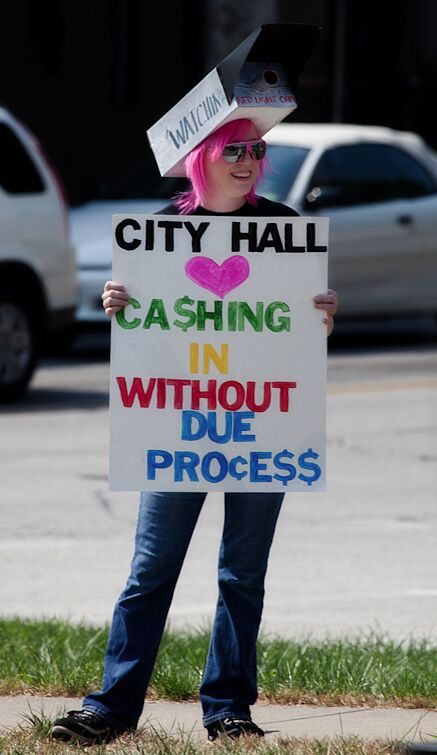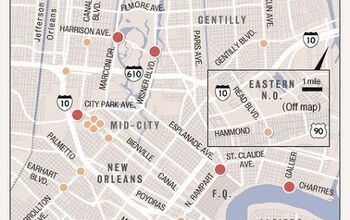California, Louisiana Supreme Courts Reject Traffic Cameras Rescues
The highest courts in California and Louisiana yesterday denied the requests of municipal officials desperate to save their photo enforcement programs. In New Orleans, the red light camera and speed camera program must shut down after the Louisiana Supreme Court unanimously rejected the city’s request to overturn the decision of Orleans Parish Civil District Court Judge Paulette R. Irons who found earlier this month that the program violated the city’s own charter.
“We are obviously disappointed in supreme court’s decision because these cameras have proven to be an important deterrent to unlawful traffic practices,” a city statement explained.
As a matter of law, the high court found no reason to overturn the Irons decision, just as the Fourth Circuit Court of Appeals had done less than two weeks ago. As victorious Attorney Edward R. Washington III considers launching a class action suit to force refunds, the city is digging in its heels, refusing to pay back citations paid under the illegal program.
“It is our position that camera violations issued through yesterday will still be valid,” the city insisted. “You must continue to pay all tickets issued until this point.”
The California Supreme Court likewise rejected a request by the cities of Santa Ana and West Hollywood to depublish an appellate decision that found cities had to provide warning notices for thirty days at each and every red light camera intersection before issuing actual tickets ( view ruling). Almost no cities do so, raising the possibility of a class action challenge to refund tickets illegally issued.
The high court rejected municipal arguments and declared the case closed, leaving it to stand with precedential value in Orange County and persuasive value throughout the state. The decision comes as justices prepare to rule on a larger case that turns on the question of whether contracts for red light camera services paid on a per-ticket basis are inherently void. That case had been pending the resolution of a case, County of Santa Clara v. Atlantic Richfield, which the court decided in July.
[Courtesy: Thenewspaper.com]
More by The Newspaper
Latest Car Reviews
Read moreLatest Product Reviews
Read moreRecent Comments
- Lorenzo The Longshoreman/philosopher Eri Hoffer postulated "Every great cause begins as a movement, becomes a business, and ends up as a racket." That pretty much describes the progression of the United Auto Workers since World War II, so if THEY are the union, the answer is 'no'.
- Redapple2 I think I ve been in 100 plants. ~ 20 in Mexico. ~10 Europe. Balance usa. About 1/2 nonunion. I supervised UAW skilled trades guys at GM Powertrain for 6 years. I know the answer.PS- you do know GM products - sales weighted - average about 40% USA-Canada Content.
- Jrhurren Unions and ownership need to work towards the common good together. Shawn Fain is a clown who would love to drive the companies out of business (or offshored) just to claim victory.
- Redapple2 Tadge will be replaced with a girl. Even thought -today- only 13% of engineer -newly granted BS are female. So, a Tadge level job takes ~~ 25 yrs of experience, I d look at % in 2000. I d bet it was lower. Not higher. 10%. (You cannot believe what % of top jobs at gm are women. @ 10%. Jeez.)
- Redapple2 .....styling has moved into [s]exotic car territory[/s] tortured over done origami land. There; I fixed it. C 7 is best looking.


































Comments
Join the conversation
Aside from dreams of revenue, why do politicians OK the cameras? 1. They think we like the cameras! Last week a blog exposed Astroturf Lobbying in the red light cam Industry. (To read it, Google Rynski and Astroturf.) Astroturf Lobbying is when a PR firm manufactures a fake grassroots movement via comments posted on news articles like this one. The politicians, sensing strong community support (they read these comment columns too), give the OK for cameras. 2. Politicians - and their extended family - are immune to the tickets. In California 1.5 million privately-owned cars have plate numbers protected from easy look up, effectively invisible to agencies trying to process red light camera violations. Such "protected plate" lists exist in other states, too. (In CA the list includes local politicians, bureaucrats, retired cops, other govt. employees, and their families and ADULT children!) In each state, someone should check to see who and how many are 'protected.'